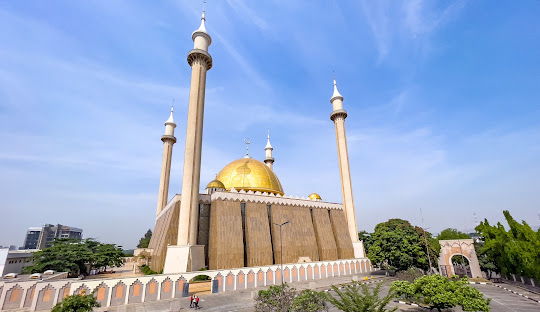Abuja, Nigeria
🌍 Abuja, Nigeria
Africa’s Rising Capital of Serenity and Strength
🏙️ Overview
Abuja, the capital of Nigeria, is a meticulously planned city that blends modern architecture, political power, and natural beauty. Set against dramatic rock outcrops like Aso Rock and Zuma Rock, the city offers an organized and calmer contrast to Lagos. Whether you're exploring open-air markets or enjoying sunsets over Jabi Lake, Abuja delivers a peaceful but culturally rich experience.
✈️ Getting There & Around
-
Airport: Nnamdi Azikiwe International Airport (ABV)
-
Visa: Required for most nationalities
-
Transport:
-
🚖 Ride-hailing apps like Bolt & Uber are reliable
-
🚗 Car rentals available for longer stays
-
🚶 Central Abuja is walkable in parts like Wuse and Garki
-
Travel Tip: Always use verified taxis or rideshare apps — they’re safer and more comfortable.
🏛️ Top Attractions
🧱 1. Aso Rock
A massive 400-meter tall rock that dominates the skyline, Aso Rock is the spiritual and political heart of the nation. Nearby is the Presidential Complex.
🕌 2. National Mosque
One of Abuja’s most beautiful buildings — open to non-Muslims outside of prayer times. The golden domes are especially photogenic at sunset.
⛪ 3. Nigerian National Christian Centre
Located near the mosque, this striking cathedral symbolizes Nigeria’s religious diversity and architectural beauty.
🧺 4. Jabi Lake & Jabi Lake Mall
Enjoy boat rides, waterside dining, and shopping. It’s also a great location for evening walks with sunset views.
🎨 5. Nike Art Gallery
A cozy gallery showcasing Nigerian art, textiles, and crafts. Interactive and deeply cultural.
🍛 Local Cuisine
🍲 Tuwo Shinkafa with Miyan Kuka
Rice flour meal served with baobab leaf soup — a northern delicacy.
🍖 Suya
Spicy grilled meat skewers served with pepper mix and onions — an evening staple on Abuja’s streets.
🥘 Egusi Soup with Pounded Yam
A thick melon seed soup — rich, flavorful, and commonly found in local restaurants.
Where to Eat:
-
The Charcoal Grill – Elegant dining with African and continental dishes
-
Bukka Hut – Authentic Nigerian food, casual and tasty
-
Dunes Continental Restaurant – High-end menu with global cuisine
🛍️ Shopping & Markets
🛒 Wuse Market
The largest market in Abuja — everything from electronics to traditional clothes and fabric. A sensory overload and a cultural immersion.
🛍️ Dunes Center
An upscale shopping mall offering luxury goods, a gourmet grocery, and restaurants.
🎨 Arts & Craft Village
Near the Sheraton Hotel, this village is perfect for buying handmade crafts, souvenirs, and locally made jewelry.
🛌 Where to Stay
🏨 Budget
-
Nordic Villa – Clean, serene, and affordable boutique guesthouse
-
Presken Hotel – Centrally located and reliable for short stays
🏨 Mid-range
-
Hawthorn Suites by Wyndham – Good mix of comfort and amenities
-
Serendib Hotel – Ideal for business travelers
🏨 Luxury
-
Transcorp Hilton Abuja – Iconic 5-star hotel with pool, casino, and fine dining
-
Fraser Suites Abuja – Chic, serviced apartments for long-stay luxury
🎉 Culture & Events
🪘 Abuja Carnival (November)
Celebrates Nigerian cultural diversity with parades, music, and traditional dances.
🖼️ Art Exhibitions
Check Thought Pyramid Art Centre and Nike Gallery for rotating displays.
🕊️ Religious Harmony
Abuja stands out for its proximity of churches and mosques, reflecting peaceful coexistence and national unity.
📅 Best Time to Visit
-
November to March: Dry season with pleasant evenings
-
Avoid: May to September (rainy season with occasional flooding)
⚠️ Travel Tips & Safety
-
Language: English is official; Hausa is also widely spoken
-
Currency: Nigerian Naira (₦)
-
Weather: Hot and dry most of the year
-
Safety:
-
Avoid unlit areas at night
-
Stay updated with local advisories and use hotel-recommended transport for long-distance travel
-
💡 Insider Tips
-
🌄 Climb Mpape Crushed Rock for an unexpected lake-and-cliff adventure with scenic views
-
💳 Carry cash — card payment doesn’t always work in markets
-
📸 Always ask before photographing people or religious buildings
🌍 Final Verdict
Abuja may not be as wild and pulsating as Lagos, but that’s precisely its charm. The calm, order, and blend of culture and government influence create a modern African capital that’s uniquely livable and appealing to both leisure and business travelers.
Fly All Over Rating: 7.5/10
✔️ Safe and serene
✔️ Cultural and culinary gems
❌ Less tourist-centric
❌ Hot climate most of the year


